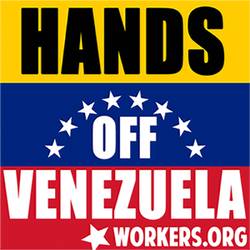Venezuela analysis: The gains of the Bolivarian Revolution
 The people of Venezuela are currently taking steps to deepen the Bolivarian Revolution, and the U.S. ruling class is now scrambling to prevent this.
The people of Venezuela are currently taking steps to deepen the Bolivarian Revolution, and the U.S. ruling class is now scrambling to prevent this.
Democratically elected President Nicolás Maduro has called for a National Constituent Assembly in order to defend the gains of the Bolivarian Revolution against an increasingly violent opposition group led by oil scions like Leopoldo López (goo.gl/fmC8fk) and bankers, such as the two from Citibank who recently attacked the Venezuelan ambassador during his recent trip to New York City (goo.gl/pF9SA3). In response, the U.S. State Department, the White House and Marco Rubio have condemned the National Constituent Assembly as illegal and called for more “democracy.”
These claims are preposterous, given that the current Venezuelan Constitution provides for such an assembly in Article 347, and given that Venezuela’s electoral process has been deemed the best in the world by none other than former U.S. president Jimmy Carter, who runs an electoral process monitoring center. It’s also deeply hypocritical for any politician in the U.S. to call for more democracy abroad, when the U.S. ruling class practices voter suppression at home and participates in the assassination of democratically elected leaders around the globe.
Meanwhile, the U.S. media, particularly the New York Times but even so-called pro-socialist magazines, have continued a shameful legacy of supporting imperialist war efforts by giving exclusive voice to the right-wing opposition in Venezuela. As it did with Iraq before the 2003 invasion, the New York Times has published numerous articles calling for U.S. intervention in Venezuela, and as with Iraq, its reasons for doing so are built on lies.
National Assembly could enshrine grass-roots institutions
There is much to defend in the Bolivarian Revolution. The misinformation campaigns run by U.S. media, however, have been successful in hiding what the Venezuelan masses have gained. The Bolivarian Missions and the Commune Movement are inspiring examples of endeavors to build socialism, and they are under threat.
While riots stemming from the wealthiest neighborhoods of Caracas rage in narrow areas, Afro-Venezuelans, Indigenous communities and other members of the most oppressed in Venezuela look forward to the National Constituent Assembly. There they hope to have the opportunity to enshrine the Bolivarian Revolution’s pro-people, pro-poor endeavors in the Constitution.
The Missions were first implemented under President Chávez and are managed by workers and citizens. They provide anti-poverty services, free medical clinics for the poor, food and housing subsidies, and support for educational campaigns and Indigenous rights.
The Communes, which were first formed in self-defense against the assault of neoliberalism in the late 1980s, are a network of neighborhood councils, self-defense groups and other grass-roots bodies of self-governance and self-determination that were connected and institutionalized at the national level under President Chávez. The communes allow communities and people to decide what their needs are and how they are met.
Enshrining these institutions in the constitution would strengthen them against attacks from a right-wing-dominated National Assembly.
Role of the U.S. left and Venezuela
The sharpening of contradictions in the U.S. have eroded the political center here and propelled some people toward new alternatives further to the left. Unfortunately, this explosive movement toward social democratic groups has not yet removed all the chauvinist, pro-U.S. indoctrination of the past.
When organizations spread or accept without question the misinformation spread by the U.S. media, they weaken the growing resistance to U.S. imperialism. This is compounded if they set up some sort of litmus test that any revolution abroad or any government under imperialist attack is almost guaranteed to fail. It is the primary role of the U.S. left to stop U.S. imperialism from intervening against other countries and movements, which must organize under difficult, often brutal conditions propagated by imperialist violence and economic sabotage.
Back in 2002, mere months after the Chávez government took the first steps toward socialism by redistributing land to peasants and the urban poor, and started using oil revenue to fund social services, democratically elected President Chávez was captured by a narrow, pro-imperialist sector of the top military as the U.S. media cheered.
Only through a heroic mass struggle and with support of other sectors of the Venezuelan armed forces were the Venezuelan people able to reverse the U.S.-backed coup — the first successful struggle to do so in Latin American history. Chavistas have not forgotten this lesson, and it is crucial that the U.S. left not forget it either.
Today, amid violence and threat of sanctions and knowing well the risks, the Venezuelan people are taking brave steps toward deepening the gains of the revolution. Only recently, during the dry run for the election of representatives to the National Constituent Assembly, armed biker gangs terrorized a polling station in a pro-government neighborhood, killing one person and injuring three others.
In the words of Assata Shakur, “It is our duty to love and support one another.” We support the Venezuelan people in their heroic struggle for socialism.

